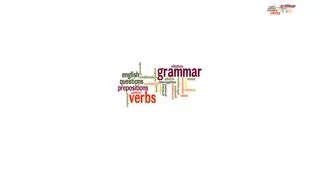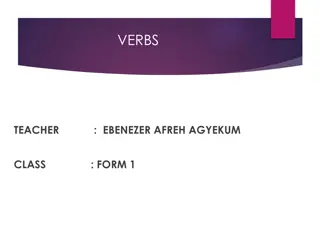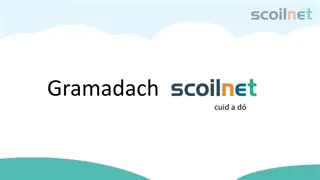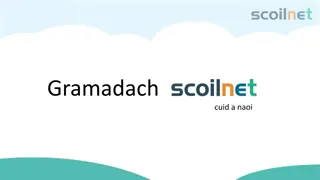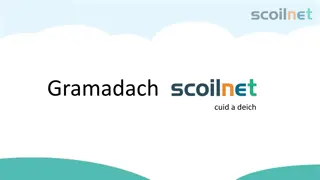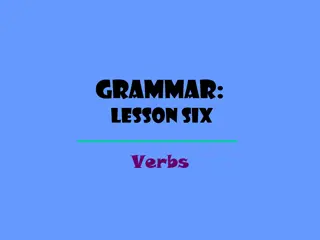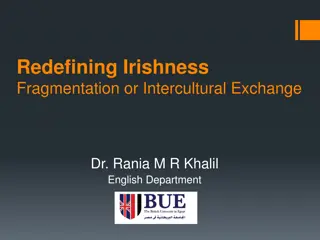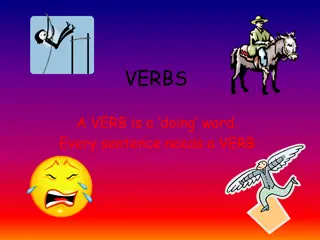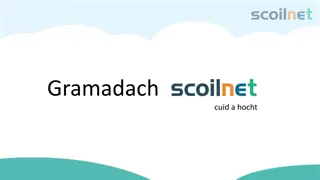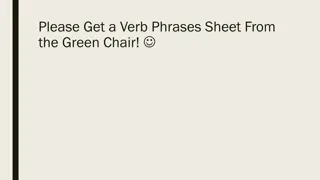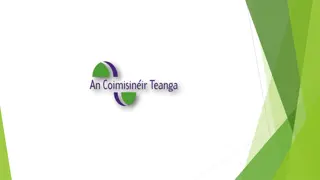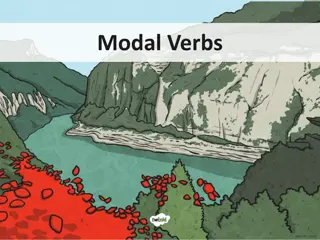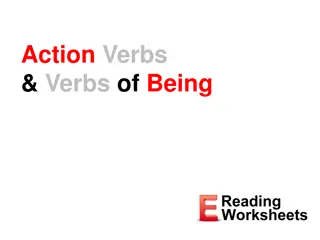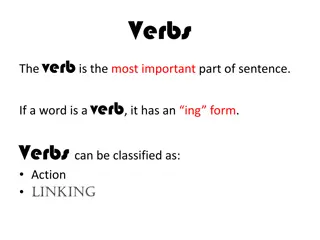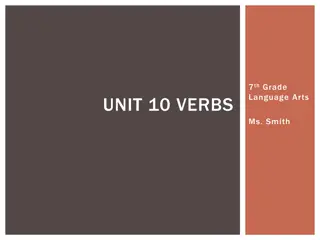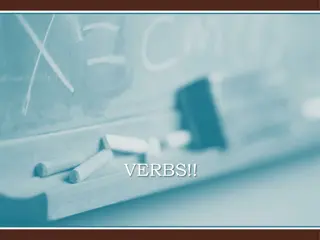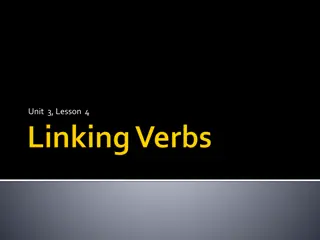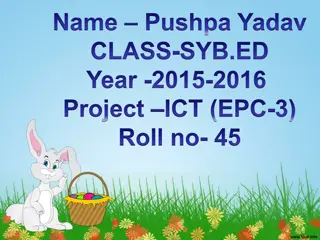Understanding Irish Verbs: Grammar Basics and Rules
Learn about Irish verbs, including what verbs are, how to conjugate them, the syntax/order of words in sentences, regular and irregular verbs, as well as broad and slender verbs. Explore examples and images to enhance your understanding of Irish grammar.
Download Presentation

Please find below an Image/Link to download the presentation.
The content on the website is provided AS IS for your information and personal use only. It may not be sold, licensed, or shared on other websites without obtaining consent from the author. Download presentation by click this link. If you encounter any issues during the download, it is possible that the publisher has removed the file from their server.
E N D
Presentation Transcript
Gramadach cuid a haon
Cad is briathar? What is a verb? A verb is a doing or action word. For example: run, talk, dance, shout, clean etc. These are examples of the stem or root of a verb. We can change these verbs into different tenses e.g. ran = past, will run = future. We can also add a possessive to show who is carrying out the action e.g. He cleaned. We can also conjugate a verb in a certain tense. This means to list all forms of a verb in that tense.
Conjugate a verb To conjugate the verb glan (to clean), we would write it as follows: Ghlan m I cleaned Ghlan t You cleaned Ghlan s He cleaned Ghlan s She cleaned Ghlanamar We cleaned Ghlan sibh You(pl)* cleaned Ghlan siad They cleaned Ar ghlan t ? Did you clean? N or ghlan m I didn t clean *In English, there is no plural of You. In some parts of the country, people may say Ye or Yous. In Irish, the plural of You is Sibh. You in the plural form is indicated by You(pl).
Syntax (Order of Words) The syntax or order of words in a sentence is very important. In English, we put the person first and then the verb. For example, we say I cleaned . In Irish, the syntax is reversed. We put the verb first and then the person. For example, we said Ghlan s . So the sentence I cleaned my room yesterday would be Glan m mo sheomra inn .
Briathra Rialta Briathra rialta (regular verbs) are verbs that follow a set of rules. For example, if you learn how to conjugate a verb in the past, present or future tense, the briathra rialta will follow the rules. Some examples of briathra rialta are: cuir to put t g to take f g to leave ceannaigh to buy d n to close ist to listen fan to wait l to drink bailigh to collect tosaigh to start caill to lose buaigh to win glan to clean irigh to get up ceap to think
Briathra Neamhrialta Briathra neamhrialta (irregular verbs) are verbs that do not follow a set of rules. Each verb has different endings and does not follow a pattern or the normal rules. They may also use a different stem or root. Fortunately, there are only 11 briathra neamhrialta. The briathra neamhrialta are: abair to say beir - to catch b to be clois to hear d an to make/do faigh - to get feic to see ith to eat tabhair to give tar to come t igh to go
Broad & Slender Verbs Before we conjugate a verb, we must determine whether it is a broad verb or a slender verb. The broad vowels in Gaeilge are a, o and u. The slender vowels in Gaeilge are i and e. If the last vowel in a one syllable verb is a, o or u, the verb is broad e.g. glan is a broad verb. If the last vowel is i or e, it is slender e.g. bris is a slender verb. If the last vowel in the 1st syllable of a two syllable verb is a, o or u, the verb is broad e.g. tosaigh is a broad verb. If the last vowel in the 1st syllable of a two syllable verb is i or e, the verb is slender e.g. bailigh is a slender verb. Remember the rule Caol le caol, leathan le leathan (Slender with slender, broad with broad)
Briathra Leathana (Broad Verbs) pioc to pick t g to take fan to wait l to drink glan to clean ceap to think tosaigh to start rothaigh to cycle brostaigh to hurry gortaigh to hurt las to light cr ochnaigh to finish ceannaigh to buy cabhraigh to help d n to close sleamhnaigh to slip
Briathra Caol (Slender Verbs) bris to break caill to lose lig to let fill to return ist to listen buail to hit goid to steal bailigh to collect/gather d isigh to wake oibrigh to work imir to play litrigh to spell irigh to get up deisigh to fix sroich to reach m in to teach


